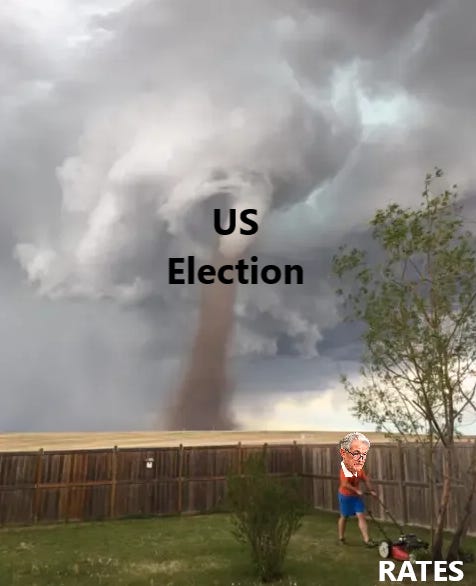The Elephant in the Room
Politics and Planning
Well, that was unexpected. Nobody, and I mean NOBODY, thought Intel would be dropped from the Dow Industrial average and replaced with Nvidia. Some of my neighbors seem really excited while others haven’t even come out of their homes since the news broke.
But onward we must go, replacing what was with what is to come. The big question is whether this changes the game of investing. Simple answer: No
The rules remain the same. Spend less than you make, invest the difference, build wealth through asset accumulation.
Don’t get me wrong, change like this does matter in the long run. For those that hate it, there is a temptation to abandon the game in protest – not recommended. For those who like it, overoptimism can lead to careless risk – equally not recommended.
Stay the course with modest rudder adjustments.
This wasn’t the only big story of the week. Despite an uptick in inflation, Jerome Powell announced on Wednesday that the Fed’s target rate would be reduced by another 25 basis points.
As big as these stories are, they have been overshadowed by the elephant. Against my (poor) prediction late last year, it looks like we are going to see some changes in Washington in 2025. I’m sure you’ve heard.
Whether you love the outcome or hate it, it’s important to remove unhelpful political and emotional when planning your future. The rules of the game are the same, but the referee calls are probably going to follow a revised rulebook. Here are my initial thoughts on this:
The TCJA personal tax cuts passed in 2017 are likely going to be extended with a few campaign promises tacked on such as tax relief on tips, overtime wages, and Social Security. The TCJA was a law passed in 2017 that broadly lowered Federal income taxes for most Americans. Keep in mind, there is no free lunch.
The QBI deduction for small business owners will likely be extended along with increased lifetime exemption limits for estate/gift planning.
Inflation expectations have moved higher, as reflected in the longer-term Treasury markets this past week. Likely due to expected increases in labor tightness, higher tariffs, lower personal taxes, and loosening regulations.
Economic policy revisions seem poised to favor domestic markets over international, strengthening the case for US equities.
These are just a few initial high-conviction points given the election results. Others, such as massive cuts in government spending, disruptive changes in foreign trade, and sweeping changes in Washington’s political structure I find to be more dubious. We will just have to wait and see.
For now, I see little to no reason to change our view that US fiscal dominance will promote deficit spending and divert much of its inflation into financial assets. While we have adjusted our bias toward the US (even more), the core thesis remains intact:
Buy and own quality assets to offset the deteriorating effects of inflation.
The opinions voiced in this material are for general information only and are not intended to provide specific advice or recommendations for any individual.
Economic forecasts set forth may not develop as predicted and there can be no guarantee that strategies promoted will be successful. All performance referenced is historical and is no guarantee of future results. All indices are unmanaged and may not be invested into directly.
There is no assurance that the techniques and strategies discussed are suitable for all investors or will yield positive outcomes. The purchase of certain securities may be required to effect some of the strategies. Investing involves risks including possible loss of principal.
Securities offered through LPL Financial LLC. Member FINRA/SIPC. Advisory Services offered by National Wealth Management Group LLC, an SEC Registered Investment Advisory and separate entity from LPL Financial LLC.





